

Common Sense - Thomas Paine. Common Sense. Pamphlet. An 18th-century painting of a girl with a basket of pamphlets Due to their low cost and ease of production, pamphlets have often been used to popularize political or religious ideas.
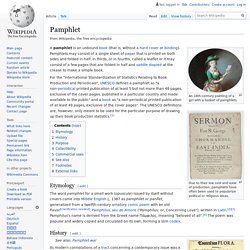
A pamphlet is an unbound book (that is, without a hard cover or binding). Pamphlets may consist of a single sheet of paper that is printed on both sides and folded in half, in thirds, or in fourths, called a leaflet or it may consist of a few pages that are folded in half and saddle stapled at the crease to make a simple book. For the "International Standardization of Statistics Relating to Book Production and Periodicals", UNESCO defines a pamphlet as "a non-periodical printed publication of at least 5 but not more than 48 pages, exclusive of the cover pages, published in a particular country and made available to the public" and a book as "a non-periodical printed publication of at least 49 pages, exclusive of the cover pages". Etymology[edit] History[edit] Purpose[edit] Collectibility[edit] See also[edit] Thomas Paine.
Paine lived in France for most of the 1790s, becoming deeply involved in the French Revolution.
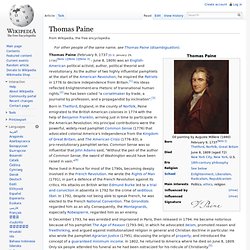
He wrote the Rights of Man (1791), in part a defence of the French Revolution against its critics. His attacks on British writer Edmund Burke led to a trial and conviction in absentia in 1792 for the crime of seditious libel. In 1792, despite not being able to speak French, he was elected to the French National Convention. Kingdom of Great Britain. Constitutional monarchy in Western Europe between 1707 and 1801 The Kingdom of Great Britain, officially called Great Britain,[1][2] was a sovereign state in western Europe from 1 May 1707 to 1 January 1801.
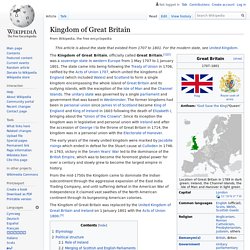
The state came into being following the Treaty of Union in 1706, ratified by the Acts of Union 1707, which united the kingdoms of England (which included Wales) and Scotland to form a single kingdom encompassing the whole island of Great Britain and its outlying islands, with the exception of the Isle of Man and the Channel Islands.
The unitary state was governed by a single parliament and government that was based in Westminster. Thirteen Colonies. British American colonies which became the United States The Thirteen Colonies, also known as the Thirteen British Colonies[2] or the Thirteen American Colonies,[3] were a group of colonies of Great Britain on the Atlantic coast of America founded in the 17th and 18th centuries which declared independence in 1776 and formed the United States of America.
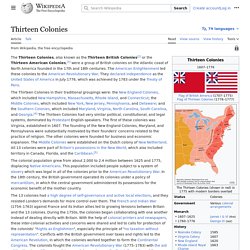
The Thirteen Colonies had very similar political, constitutional, and legal systems and were dominated by Protestant English-speakers. Egalitarianism. Trend of thought that favors equality for all people Egalitarianism (from French égal, meaning 'equal'), or equalitarianism,[1][2] is a school of thought within political philosophy that prioritizes equality for all people.[3] Egalitarian doctrines are generally characterized by the idea that all humans are equal in fundamental worth or moral status.[4] According to the Merriam-Webster Dictionary, the term has two distinct definitions in modern English,[5] namely either as a political doctrine that all people should be treated as equals and have the same political, economic, social and civil rights,[6] or as a social philosophy advocating the removal of economic inequalities among people, economic egalitarianism, or the decentralization of power.
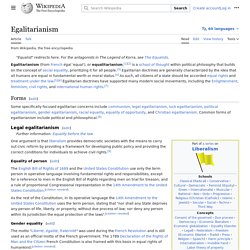
Some sources define egalitarianism as the point of view that equality reflects the natural state of humanity.[7][8][9] Forms[edit] Legal egalitarianism[edit] Equality of person[edit] American Revolution. The American Revolution was a political upheaval that took place between 1765 and 1783 during which colonists in the Thirteen American Colonies rejected the British monarchy and aristocracy, overthrew the authority of Great Britain, and founded the United States of America.
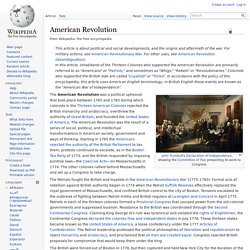
The American Revolution was the result of a series of social, political, and intellectual transformations in American society, government and ways of thinking. Starting in 1765 the Americans rejected the authority of the British Parliament to tax them; protests continued to escalate, as in the Boston Tea Party of 1773, and the British responded by imposing punitive laws—the Coercive Acts—on Massachusetts in 1774. The other colonies rallied behind Massachusetts and set up a Congress to take charge. The Patriots fought the British and loyalists in the American Revolutionary War (1775–1783). Origins Background to 1763. American Revolutionary War. War between Great Britain and the Thirteen Colonies, which won independence as the United States of America The American Revolutionary War (1775–1783), also known as the American War of Independence,[43] was a war between Great Britain and its Thirteen Colonies in North America which declared independence in July 1776 as the United States of America.
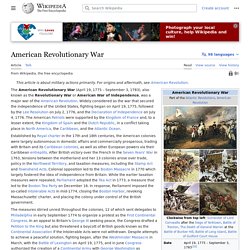
[N 1] Background Taxation disputes. Antoine Gilbert Griffet de Labaume. Antoine Gilbert Griffet de Labaume (21 November 1756, Moulins – 18 March 1805) was an 18th-century French writer, playwright and translator.
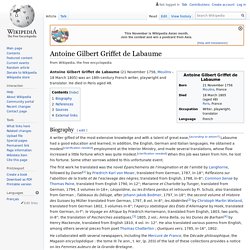
He died in Paris aged 48. Biography[edit] Battles of Lexington and Concord. The Battles of Lexington and Concord were the first military engagements of the American Revolutionary War.[9] The battles were fought on April 19, 1775 in Middlesex County, Province of Massachusetts Bay, within the towns of Lexington, Concord, Lincoln, Menotomy (present-day Arlington), and Cambridge.
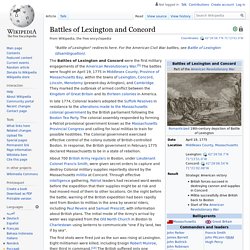
They marked the outbreak of armed conflict between the Kingdom of Great Britain and its thirteen colonies in America. In late 1774, Colonial leaders adopted the Suffolk Resolves in resistance to the alterations made to the Massachusetts colonial government by the British parliament following the Boston Tea Party. The colonial assembly responded by forming a Patriot provisional government known as the Massachusetts Provincial Congress and calling for local militias to train for possible hostilities. Benjamin Rush. 18th and 19th-century American physician, educator, author Rush was a leader of the American Enlightenment and an enthusiastic supporter of the American Revolution.
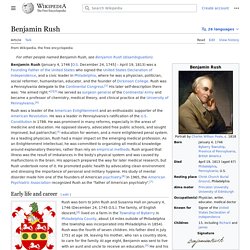
He was a leader in Pennsylvania's ratification of the Constitution in 1788. He was prominent in many reforms, especially in the areas of medicine and education. He opposed slavery, advocated free public schools, and sought improved education for women and a more enlightened penal system. As a leading physician, Rush had a major impact on the emerging medical profession. Early life and career[edit] Pennsylvania Evening Post. The Pennsylvania Evening Post, a Philadelphia newspaper printed by Benjamin Towne from 1775 to 1784, was the first newspaper to print the United States Declaration of Independence, which it published on July 6, 1776. The Post was also the first newspaper to publish the Lee Resolution, which established the new country.
Known as "The Resolution for Independence", the Lee Resolution was passed by the Second Continental Congress on July 2, 1776, and printed in The Pennsylvania Evening Post that evening.[1][2][3] After initially appearing three times a week, in 1783 Towne began publishing the Pennsylvania Evening Post every day, making it the first daily newspaper in the United States.[1][2] See also[edit] Hartford Courant. The Hartford Courant is the largest daily newspaper in the U.S. state of Connecticut, and is often recognized as the oldest continuously published newspaper in the United States.
A morning newspaper serving most of the state north of New Haven and east of Waterbury, its headquarters on Broad Street are a short walk from the state capitol. It reports regional news with a chain of bureaus in smaller cities and a series of local editions. It also operates CTNow, a free local weekly newspaper and website. Beginning in 2000, it was owned by Tribune Company, which later combined the paper's management and facilities with those of Tribune-owned WTIC-TV in Hartford. In 2014, the newspapers were spun off to corporate parent Tribune Publishing.
History[edit] Courant building on State Street (about 1900) Age of Enlightenment. European cultural movement of the 17th, 18th, and 19th centuries. Renaissance humanism. Revival in the study of classical antiquity Renaissance humanism was a revival in the study of classical antiquity, at first in Italy and then spreading across Western Europe in the 14th, 15th, and 16th centuries.
The term humanism is contemporary to that period, while Renaissance humanism is a retronym used to distinguish it from later humanist developments.[1] Renaissance humanism was a response to what came to be depicted by later whig historians as the "narrow pedantry" associated with medieval scholasticism.[2] Humanists sought to create a citizenry able to speak and write with eloquence and clarity and thus capable of engaging in the civic life of their communities and persuading others to virtuous and prudent actions. State of nature. Hypothetical conditions of human life before society The state of nature, in moral and political philosophy, religion, social contract theories and international law, is the hypothetical life of people before societies came into existence.[1] Philosophers of the state of nature theory deduce that there must have been a time before organized societies existed, and this presumption thus raises questions such as: "What was life like before civil society?
"; "How did government first emerge from such a starting position? ," and; "What are the hypothetical reasons for entering a state of society by establishing a nation-state? ". In some versions of social contract theory, there are no rights in the state of nature, only freedoms, and it is the contract that creates rights and obligations. In other versions the opposite occurs: the contract imposes restrictions upon individuals that curtail their natural rights. Noted philosophers[edit] Mozi[edit] Thomas Hobbes[edit] John Locke[edit] David Hume[edit] Constitutional monarchy. A constitutional monarchy is a form of monarchy in which the sovereign exercises authority in accordance with a written or unwritten constitution.
Constitutional monarchy differs from absolute monarchy (in which a monarch holds absolute power) in that constitutional monarchs are bound to exercise their powers and authorities within the limits prescribed within an established legal framework. John Locke. Magna Carta. Charter of rights agreed to by King John of England in 1215 Magna Carta Libertatum (Medieval Latin for "the Great Charter of the Liberties"), commonly called Magna Carta (also Magna Charta; "Great Charter"),[a] is a charter of rights agreed to by King John of England at Runnymede, near Windsor, on 15 June 1215.
[b] First drafted by the Archbishop of Canterbury to make peace between the unpopular King and a group of rebel barons, it promised the protection of church rights, protection for the barons from illegal imprisonment, access to swift justice, and limitations on feudal payments to the Crown, to be implemented through a council of 25 barons. Neither side stood behind their commitments, and the charter was annulled by Pope Innocent III, leading to the First Barons' War. After John's death, the regency government of his young son, Henry III, reissued the document in 1216, stripped of some of its more radical content, in an unsuccessful bid to build political support for their cause. The Age of Reason. Rights of Man. Rights of Man (1791), a book by Thomas Paine, including 31 articles, posits that popular political revolution is permissible when a government does not safeguard the natural rights of its people. Using these points as a base it defends the French Revolution against Edmund Burke's attack in Reflections on the Revolution in France (1790).[1] It was published in two parts in March 1791 and February 1792.[2]
American philosophy. Thomas Paine.